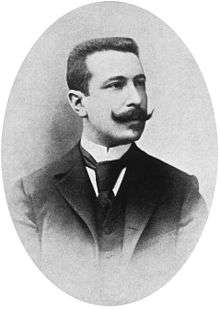Georges-Fernand Widal

Georges-Fernand-Isidor Widal; (born on March 9, 1862 in Dellys, Algeria and died in Paris on January 14, 1929) was a French physician.
From 1886 to 1888 he devoted himself to public demonstrations of the researches of the faculty of pathological anatomy, and during the 2 years following was in charge of a course in bacteriology in the laboratory of Professor Victor André Cornil (1837-1908). In 1895 he was appointed visiting physician to the hospitals of Paris, and in 1904 became an instructor in the faculty of medicine. In 1905 he became a physician to the Hôpital Cochin, and was in charge of the medical clinics at the same institution.
Widal was the author of a remarkable series of essays on infectious diseases, erysipelas, diseases of the heart, liver, nervous system, etc., besides being a prolific contributor to various medical journals and encyclopedias. His name is associated with the Widal test, a diagnostic test for typhoid fever, and with hematologist Georges Hayem (1841-1933), he described acquired haemolytic anaemia, a disease that was historically referred to as "Hayem-Widal syndrome".
Literary works
- Etude sur l'infection puerpérale, 1889.
- La cure de déchloruration dans le mal de Bright, 1906.
- Maladies des veines et des lymphatiques, 1911.
- Nouveau traité de médicine, 22 Vols., 1923 (with Georges Henri Roger, Pierre Joseph Teissier).
References

- Georges-Fernand-Isidor Widal @ Who Named It
External links
- Félix Charpentier. Sculptor of Widal bust.